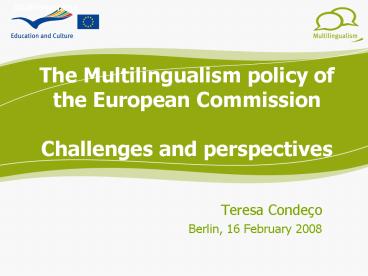The Multilingualism policy of the European Commission Challenges and perspectives
1 / 42
Title:
The Multilingualism policy of the European Commission Challenges and perspectives
Description:
Europe is more multilingual by the day. Enlargements of the European Union ... Learning one lingua franca alone is not enough. ... –
Number of Views:127
Avg rating:3.0/5.0
Title: The Multilingualism policy of the European Commission Challenges and perspectives
1
The Multilingualism policy of the European
CommissionChallenges and perspectives
- Teresa Condeço
- Berlin, 16 February 2008
2
CONTEXT
- Europe is more multilingual by the day
- Enlargements of the European Union
- Greater mobility in the Single Market
- Ancient and new migratory flows
- Globalisation
3
CONTEXT
- 27 Member States
- 23 official languages
- more than 60 other EU autochthonous languages
- more than 450 spoken languages in EU
4
Multilingualism
- a tool for understanding and integration
- the co-existence of different language
communities in one geographical area
5
Why learn languages?
- Languages are essential for the construction of
Europe - The promotion of linguistic diversity is one of
the objectives of the European Union
6
Why learn languages?
- A basic skill for all Europeans
- communication
- work, trade, study, travel
- understanding
- tolerance
- solidarity
7
Key messages
- Learning languages provides people with many
benefits new career possibilities,
self-fulfilment, deeper understanding of ones
own and others cultures. - Learning languages can be accessible
8
Key messages
- Learning one lingua franca alone is not enough.
- Mother tongue two other languages for every
citizen
9
Key messages
- widest possible range of languages in our
schools, universities, adult education centres
and enterprises.
10
Key messages
- Range should include
- smaller as well as larger EU official languages
- regional,minority, as well as national
languages
11
Key messages
- migrant languages
- languages of trading partners
12
Why learn languages?
- Introduction - Europeans and their languages
13
Why learn languages?
- Introduction - Europeans and their languages
14
Why learn languages?
- Introduction Foreign languages taught on
secondary education - 85 English
- 25 French
- 17 German
15
Why learn languages?
- For
- jobs and growth (Lisbon strategy
http//ec.europa.eu/growthandjobs/index_en.htm) - tolerance and understanding
16
The founding stones
- European Year of Languages 2001
- Action plan promoting language learning and
linguistic diversity 2004-2006 - A new framework strategy for multilingualism
(2005)
17
The founding stones
- Action Plan promoting language learning and
linguistic diversity 2004-2006 - lifelong learning
- better language teaching
- building a language-friendly environment
18
Pre-primary and primary
- At least two foreign languages from a very early
age - For this
- well-trained teachers
- schools with resources
- time on curriculum
19
Secondary and vocational
- Mastery of at least two foreign languages
- Aim effective communicative ability
- not native speaker perfection
20
Higher Education
- Languages for all students - of all subjects
- study abroad in a foreign language
- gain a language qualification as part of degree
21
The language-friendly school
- A holistic approach, make connections between
curricula for - mother tongue
- foreign languages
- language of instruction
- languages of migrant communities
22
Language teacher training
- Language teachers
- play crucial role in building multilingual Europe
- exemplify European values
23
Language-friendly communities
- A community where people
- are aware of the many languages around them and
open to this diversity - are exposed to other languages
24
Language-friendly communities
- learn from the skills of migrants and others
- take every opportunity to speak and learn
languages
25
The founding stones
- A new framework strategy for multilingualism
(2005) - multilingual society
- multingual economy
- multingualism and citizens
26
Tools
- Funding programmes
- Cooperation with Member States
- Experts groups
27
Lifelong language learning
- Key Activity Languages
- Networks
- good practices that serve to motivate language
learners
28
MOTIVATION
- On line consultation
- factors for successful language learning
- early start
- direct experience of the country of the
target language
29
Motivation
- And also
- Adjusting teaching methods to learners needs and
capabilities - Use of multimedia in the classroom
30
Motivation
- Important factor leading to good quality language
teaching
31
Cooperation Member States
- First Ministerial Conference on Multilingualism
- Ministers of Education and Culture of Member
States
32
Experts Groups
- High Level Group on Multilingualism
- Group of Intellectuals for Intercultural Dialogue
- Business Forum
33
High Level Group Multilingualism
- Independent experts
- Languages and media
- Languages for business
- Interpretation and translation
- Research
- MOTIVATION
34
High Level Group Multilingualism
- Motivation is key to language learning
- Enhance motivation n 1 priority of language
teaching at school - Target new groups of learners
35
Group Intellectuals
- Chaired by writer Amin Maalouf
- Languages and intercultural dialogue
- Motivate European citizens to learn a "second
mother tongue
36
Group Intellectuals
- Languages in the dialogue of cultures Keynote
speech Maalouf - 2008 European Year of Intercultural Dialogue
37
Business Forum
- Language training for business employees
- Language management strategies within companies
- Enhancing the use of intercultural skills
38
New Communication 2008
- WHY?
- More EU Member States
- More intra-European mobility
- More immigration from third countries
- More global competition
39
New Communication 2008
- Citizens need languages to study, work and travel
abroad - Companies need languages to be competitive
- Civil society needs languages for intercultural
dialogue
40
New Communication 2008
- Reaffirm the basis of multilingualism policy in
Europe - Set areas for common work with Member States to
foster multilingualism policy
41
A more comprehensive policy
- Member States endorse a comprehensive policy for
multilingualism - Mainstream multilingualism in relevant European
policies
42
Promoting multilingualism in EuropeChallenges
and futures perspectives
- More information?
- Languages Portal http//europa.eu/languages/
- Multilingualism policy http//ec.europa.eu/educat
ion/policies/lang/languages_en.html































